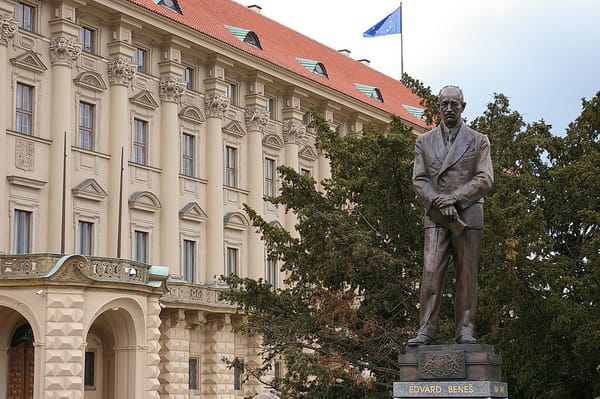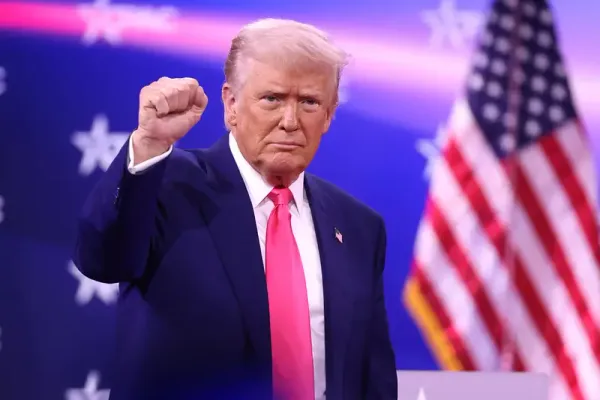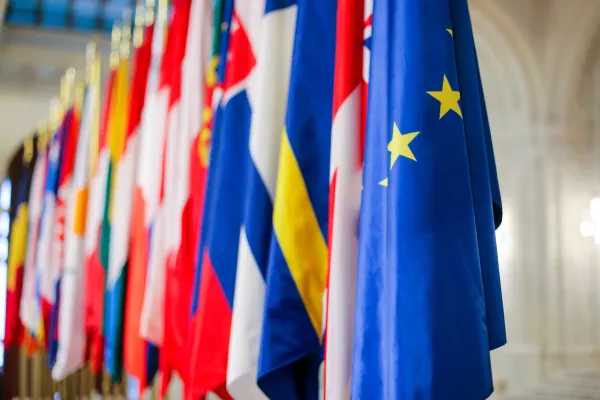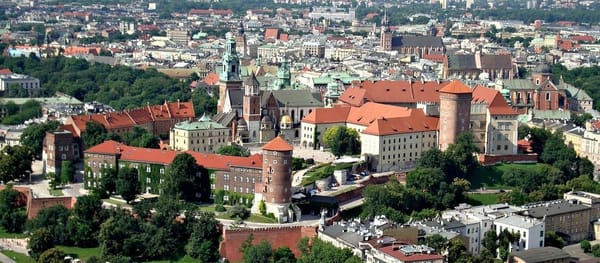
Europe's road from Ostpolitik to a possible total Russian energy ban - CET analysis
Mutually beneficial business relations were meant to cement cooperation and peace in Europe after WWII. This post-world war global order is now in danger of falling apart, as sanctions against Russia are extended to technology, industry and agriculture, finances and energy. How did the road to globalism begin five decades ago – and is that era now coming to a close?
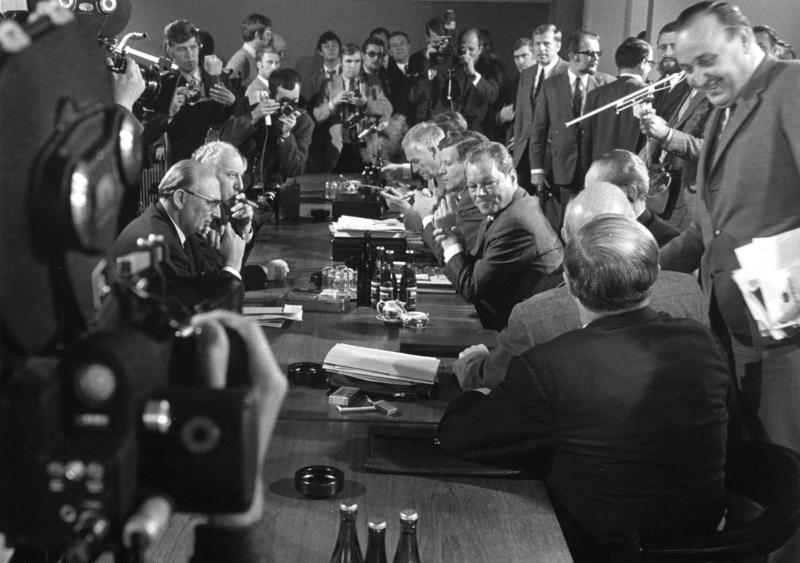
The Russian invasion of Ukraine and resultant broad sanctions are reshaping global trade relations and may signal the end of the era of globalism which had already been teetering on the brink. Sanctions put in place in 2014 have already diminished trading relations between Russia and Central and Eastern European (CEE) countries. However CEE is still unprepared for a total fossil fuels embargo.
Globalism, with all its benefits and drawbacks, was meant to unite humanity via the exchange of goods and ideas – and, increasingly, by technology. One of the many consequences of globalism, but perhaps the most important, has been interdependence. Networks of dependencies, after all, have been a key function of commerce for millennia.
The post-WWII globalist world order began to show cracks over the last decade in areas including – to mention a few of the hard issues – widespread industrial espionage, frequent currency devaluations and fear of state-led offensive cyber operations. Huawei’s global dominance in 5G mobile network building, China’s rival to GPS navigation, Beidou, and a large-scale build-up of Chinese military in the South China See have all sent tremors through the Western world. These developments ultimately resulted in a tariff war between the US and China, which is the antithesis of the globalism that began in the mid-20th Century.
Tectonic shifts challenge the rules-based framework
The war in Ukraine may have delivered the coup de grâce to the era of globalism. It seems the last ballasts of globalism, such as the dollar as the world’s reserve currency, and SWIFT as a global provider of financial transactions (namely the Bretton Woods Agreement and System) are also on the verge of collapse.
The System for Transfer of Financial Messages (SPFS) that Russia has developed to replace SWIFT will not cause it to collapse the next day. However the world has seen a precedent, and the broad sanctions imposed on Russia have starkly revealed the vulnerability that interdependence brings. These sanctions and their results are being closely observed by Asia.
As Pierre-Olivier Gourinchas, a leading IMF economist put it: “the war increases the risk of a more permanent fragmentation of the world economy into geopolitical blocks with distinct technology standards, cross-border payment systems, and reserve currencies. Such a tectonic shift would cause long-run efficiency losses, increase volatility and represent a major challenge to the rules-based framework that has governed international and economic relations for the last 75 years.”
How did we get here?
When the Nixon administration gave up the policy of containment and isolation towards China in 1972, increased Chinese export to the US was viewed as increased leverage on China. In return, China acquired an equally important leverage on the US by becoming a vital partner to every Fortune 500 company in the US.
Similarly, economic and monetary interdependence supplanted the post-WWII policy of increased military capacity in Germany, and led to an “economic miracle”. Tying German economic development to cheap Russian energy sources was a conscious policy fuelled by the conviction that trade and mutual interests would contribute to peace in Europe.
For 50 years, Russian gas has powered German homes and businesses, and Germany remains the Western European country most reliant on Russian energy.
Business between West Germany and the Soviet Union began to flourish after Chancellor Konrad Adenauer had re-established diplomatic relations with the Soviet Union in 1955. The countries subsequently signed bilateral trade agreements in 1958 and 1960. The Kennedy administration raised eyebrows when Germany provided large diameter steel pipes for the world’s longest oil pipeline, Druzhba (“Friendship Pipeline”) of the Soviet Union which came into operation in 1964 and linked much of Eastern Europe with Russia.
‘Pipes for gas’ pre-dated fall of Communism
Bilateral trade entered a new phase when West German Chancellor Willy Brandt declared an Ostpolitik policy, the concept of “change through rapprochement”, in the late 1960s. This led to a historic deal between the Soviet Union and West Germany in 1970 known as “pipes for gas”, under which gas imports from the Soviet Union would be compensated by steel pipe exports by West Germany. The agreement was viewed as a trust-building measure between the Soviet Union and Western Europe, and a significant milestone in the history of the Cold War. By 1973, Russian gas was flowing to West (and East) Germany.
Many other deals followed and German imports of Russian gas increased steadily throughout the rest of the 1970s. The first Soviet natural gas export pipeline, Soyuz, an extension of Transgas that traversed present-day Czechia into Bavaria, south Germany, began operations in 1978.
Soyuz was followed by the Brotherhood pipeline in 1983 and the Progress pipeline (Yamburg–Western border pipeline) in 1988. The oil crisis in the mid-1970s had even enhanced the dependency of Germany on Russian gas, which caused growing concerns of US presidents of the 1970s and 1980s.
Nonetheless, the business relationship was seen as beneficial for both sides and developed undisturbed, and even evolved into a strategic partnership between the two countries under German Chancellor Gerhard Schroder.
Nord Stream 2 suddenly looks like impossible pipe dream
Though strongly opposed by Poland and the Baltic States, the Yamal pipeline was put into operation in 2006, Nord Stream 1 in 2012 and even Nord Stream 2 was set to be authorized in Germany, prior to the the invasion of Ukraine. According to Russian customs data, Germany received nearly 20% of all Russian gas exports in 2020, making the EU’s largest economy its biggest customer.
Only two months after Russia’s invasion of Ukraine, much of Europe is committed to moving away from Russian energy sources as soon as possible. Of course, the billion-dollar question is whether Europe will finally levy a blanket embargo on Russian oil and gas, and what impact it could have on the continent’s economy. Eleven European Union states led by Denmark have already formed a coalition in support of ending the bloc’s dependence on Russian energy.
As for the extent to which Germany’s gross domestic product will fall in the event of a total embargo, estimates vary between 0.5% to as much as 3%. Leading German economic institutes warn of a serious economic recession and hundreds of thousands of job losses in the event of gas supplies from Russia halting. As all CEE economies are closely tied to Germany and even more exposed to Russian gas, it is not hard to predict an economic decline of similar scale in those countries too, if sanctions are to be extended to energy.

